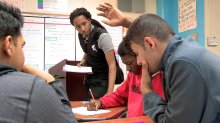Closing the Achievement Gap With SEL
A Nashville high school focuses on using social and emotional learning to build strong relationships and a positive culture—and to improve academic outcomes.
Your content has been saved!
Go to My Saved Content.Nashville’s Pearl-Cohn High School is trying to close its achievement gap. Over 90 percent of the roughly 800 students receive free or reduced-price lunch, and 90 percent have identifiable trauma in their backgrounds. The school meets these challenges head-on, striving to accommodate the academic needs of all students with trauma-informed practices and pedagogy grounded in social and emotional learning (SEL).
“Our kids come to us with lots of opportunities for growth, especially when it comes to literacy,” says Principal Sonia Stewart, who arrived five years ago and was named Nashville’s Executive Principal of the Year in 2017.
But the real work begins with the adults. Stewart identified a need to expand the skill set of her staff before she could expect a change in practices or school culture. Staff members have opened themselves up to a deeper commitment of knowing the kids, and the focus on building strong student-teacher relationships and setting high expectations gives kids the tools they need to thrive socially, emotionally, and academically.
Inside Pearl-Cohn, you can’t miss the sense of focus and mission: The halls are lined with posters reminding kids of the school’s core values—five principles, including grit and personal responsibility—and the consistent messaging extends into the classrooms. “There’s a common language,” explains social studies teacher Jessica Hansen. “The expectations in my classroom look exactly the same way as in another classroom. So there’s no confusion, and that creates more time for valuable instruction.”
Forging a Strong Culture Through Relationships
The foundation is relationships—between students and the adults in the building, but also within the student and adult peer groups. “We’ve worked not only to assemble a team of teachers who really understand teaching and learning but are really able to build those quality relationships and then generate outcomes,” says Stewart.
The relationship work is grounded in SEL, as are the systems the school has established to improve outcomes—the five core values, displayed in every hallway, are Answer the Call, More Grit, Others First, Own it, and No Limits.
Teachers regularly observe each other and provide peer feedback, building stronger relationships, unearthing better teaching practices, and increasing their ability to apply consistently high standards across the school.
It Starts With the Staff
Teachers at Pearl-Cohn work together in small groups called flocks, an approach devised by a group of teachers as a way to ensure that academic expectations and standards of behavior were applied consistently across the school.
The objective isn’t compliance, according to Stewart. “When you’re consistent—room to room, hallway to hallway, academy to academy—kids know what to expect, and so they feel safe within that structure, and are quicker to learn.”
Combining SEL Work With Literacy
The teachers have flocks, and the students have nests—the school’s name for a daily 40-minute advisory meeting that combines student SEL work and literacy. These small groups build a family mindset through extensive sharing and reading together, grounded in the idea that a atmosphere of safety will increase all students’ willingness to participate actively in all of their classes.
During nest periods, students also read a novel together. Stewart takes this reading initiative especially seriously. Literacy is “a civil rights issue,” she says matter-of-factly, because if the students can’t read, they can’t actively participate in their own democracy and society.
Helping Students Manage Their Emotions
Like adults, adolescents have moments of internal stress and interpersonal stress, but often kids have not developed positive ways of dealing with intense emotions. A strategy that Pearl-Cohn employs—one in use in other parts of the country as well—is to give students a place to go to physically remove themselves from a negative situation. These de-escalation zones allow students to process their emotions and calm down: “It’s giving us the time to cool down.... It gives me the opportunity to be like, ‘OK, yeah, taking this breath, I can talk now without trying to cry.’ Just letting us do that makes it better,” says 11th-grade student Mary.
Exceptional education teacher Rachael Hunt says of the school’s approach, “When you say, ‘I see you, I recognize you, and I’m going to teach you how to take that moment to walk away, recenter, and come back and do what you need to do,’ that’s actually teaching resilience and grit.”
An Alternative to Suspension
Conflict resolution is also part of Pearl-Cohn’s approach to infractions that previously might have merited in-school suspension. In the school’s restorative circles, conducted in a space called the Zone, counselors guide students to recognize the impact of their behavior on their peers—and the school community as a whole.
Rashida Fetuga, a social and emotional learning specialist at the school, sees the Zone as an opportunity for growth. “Young people have to be given space to grow, and to feel like, ‘OK, I made a mistake, but from this learning experience I can continue to become better.’”
Pearl-Cohn Entertainment Magnet High School
Enrollment
680 | Public, UrbanPer Pupil Expenditures
$12487 DistrictFree / Reduced Lunch
72%DEMOGRAPHICS:
This story was produced by Edutopia as part of a series developed in collaboration with the National Commission on Social, Emotional, and Academic Development, with support from the Chan Zuckerberg Initiative.
